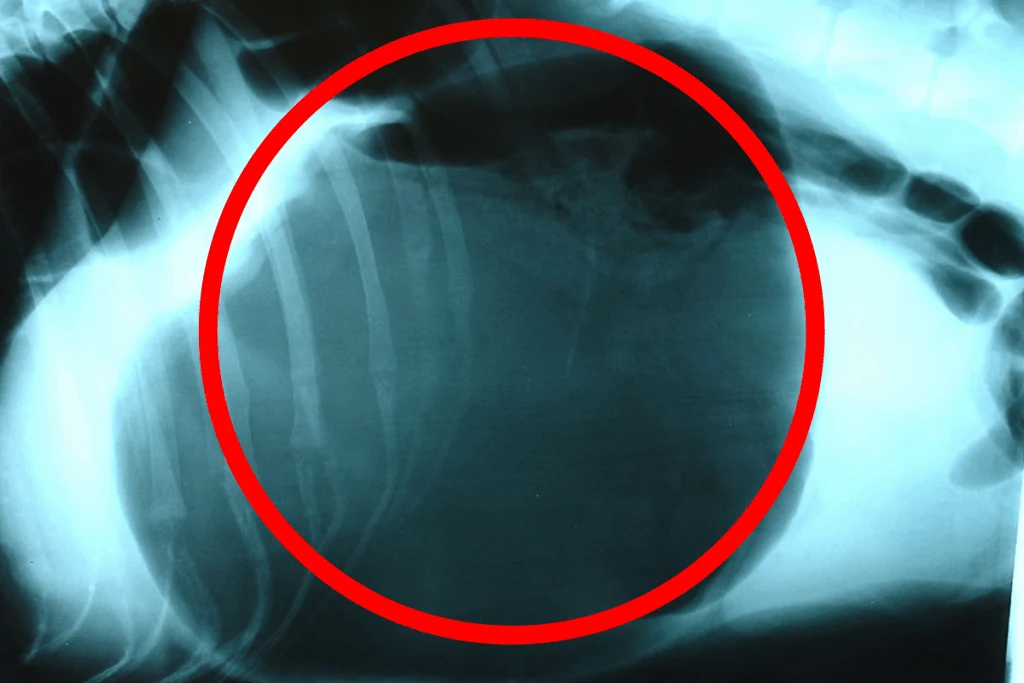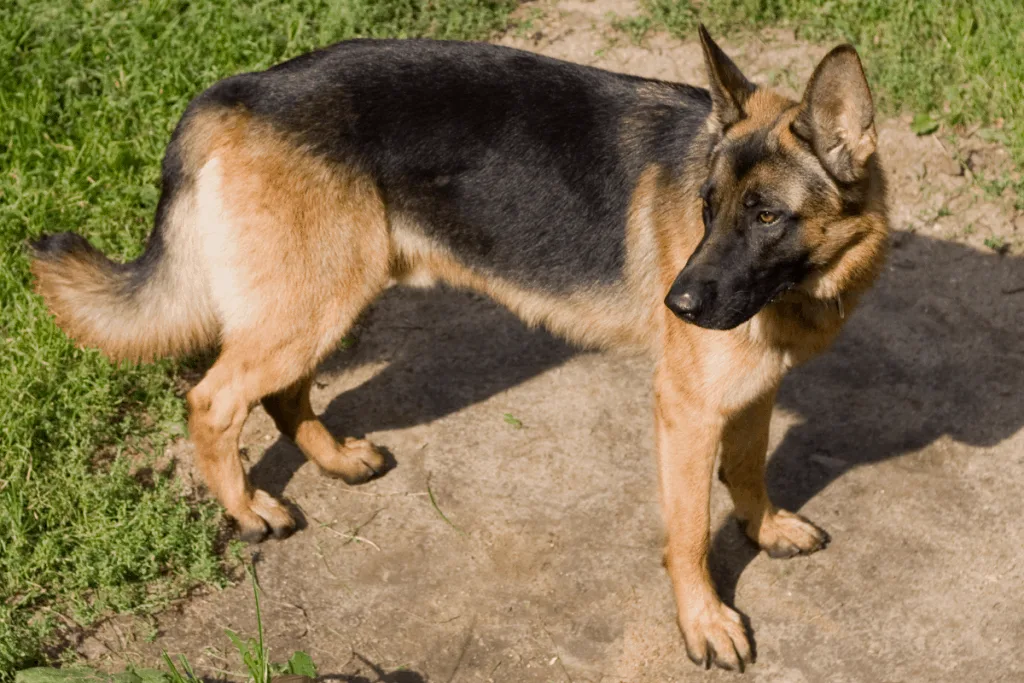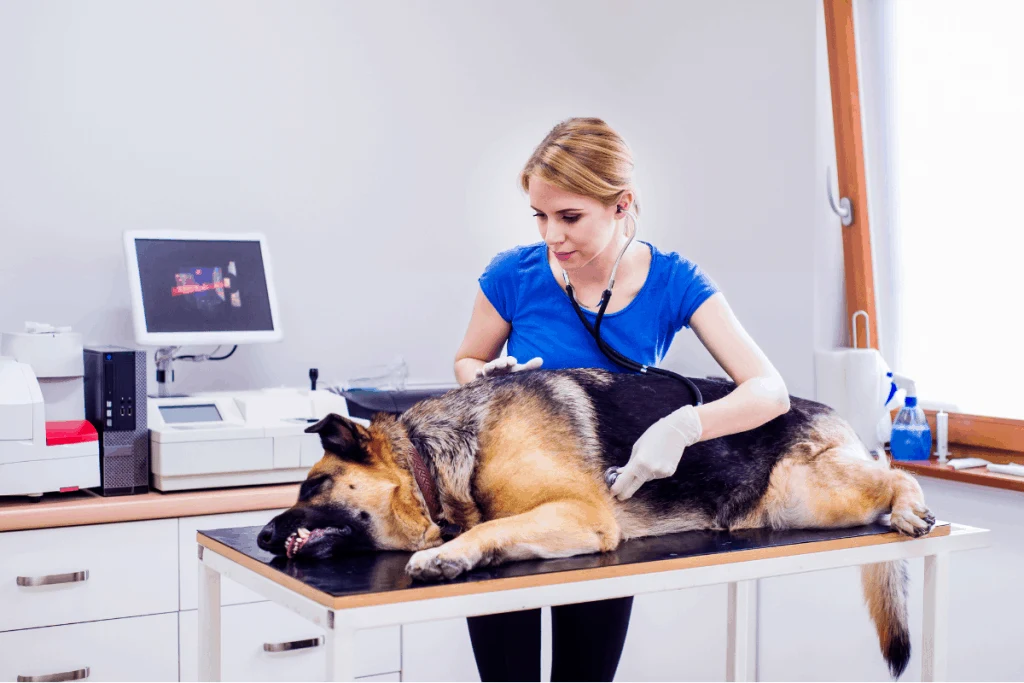
Bloat in dogs is known as Gastric Dilatation Volvulus (GDV). Dogs with deep chests are more at risk of GDV.
In addition to German Shepherds, these include Doberman Pinschers, Gordon Setters, Great Danes, Irish Wolfhounds, Rhodesian Ridgebacks, Saint Bernards, and Standard Poodles.
Bloat in German Shepherds is life-threatening. The causes are unknown, but there are known risk factors including eating or drinking too quickly and too much exercise after eating. Prevention includes feeding your dog two smaller meals a day and keeping them inactive following meals.
As we’ve just mentioned, bloat is extremely dangerous in dogs. If your German Shepherd starts to bloat, you will need to treat it immediately and take steps to prevent GDV from occurring in the future.
Read on to learn all about bloat in German Shepherds and what you can do to prevent this condition from occurring with your beloved pup!
Click Here to Jump to a Section
Pathophysiology Of Bloat In German Shepherds
In GDV, a German Shepherd’s stomach twists up to 360° in a clockwise direction (more common) or up to 90° in a counterclockwise direction around its longitudinal axis. Gas distention can occur before or after this torsion.
This torsion interrupts the blood supply to the stomach and can cause ischemia. It also interrupts blood’s return to the heart from the stomach and back end of the body and can cause hypotension.
Stomach torsion will also pull and twist the spleen and pancreas, interrupting the blood supply to these organs.
Stomach torsion can partially or fully close the esophagus. The distention then has no way of being abated or released through burping or vomiting. The distended stomach can put pressure on the liver, interrupting the blood supply to this organ.
Symptoms Of Bloat In German Shepherds
The early stages of bloat or GDV in German Shepherds are symptomized by:
- Discomfort. Your German Shepherd may shift from foot to foot, trying to find a comfortable position. They may whimper and moan when moving or lying down. They might turn to look at or bite at their sides. The discomfort may also cause your German Shepherd to pace.
- Visible or palpable distention: You may be able to see that your German Shepherd is bloated, or you may be able to feel it; their abdomen will be hard, and touching it will cause a pain reaction in your dog.
- Hypersalivation: Pain and nausea can make your German Shepherd drool.
- Retching without emesis: Your German Shepherd may retch as if they are going to vomit. However, the block in the esophagus will prevent actual vomiting.
- Tachycardia: The distress, pain, and hypotension may cause your German Shepherd’s heart rate to increase. You can usually see or feel this increased heart rate.
Symptoms of advanced GDV in German Shepherds:
- Pale gums: Pale gums are a good general indicator that your German Shepherd is not well. In this case, it can indicate shock.
- Trouble breathing: The cardiovascular and respiratory systems are closely linked, and massive issues involving the cardiovascular system, as occur with GDV, can seriously affect the respiratory system. A German Shepherd’s distress can also cause difficulty breathing.
- Weak pulse: Your German Shepherd’s heart rate is still high, but the loss of blood volume in the blood vessels means their pulse will be weak.
- Unresponsiveness or collapse: Your German Shepherd may fall over or lie down and become unresponsive.
Dangers Of Bloat In German Shepherds
Obviously, a twisted stomach is a dangerous condition, but what exactly makes it dangerous?
As mentioned, stomach torsion can cut off the blood supply to the stomach, spleen, and pancreas, and stomach distention can cut off the liver’s blood supply.
Organs without a proper blood supply will start to shut down or go into shock. The pancreas will also start to release toxic hormones into the bloodstream, which can cause sudden cardiac arrest.
The distended stomach can rupture, causing massive internal hemorrhaging and damage to the surrounding organs.
The effects on the cardiovascular system will also affect breathing, and your German Shepherd can show signs of respiratory distress, further limiting the supply of oxygen to vital tissues.
Without treatment, GDV is fatal in German Shepherds.
Causes Of Bloat In German Shepherds

The exact causes of bloat or GDV in German Shepherds are unknown. This is very frustrating to owners and veterinarians alike.
However, certain factors have been shown to increase the chance of a German Shepherd developing bloat:
- Old age.
- Deep, narrow chest shape.
- Genetic factors and inheritance (if a dog related to your German Shepherd suffers from bloat, your German Shepherd may be at-risk).
- Male German Shepherds seem to have a higher chance of bloat than female German Shepherds.
- Previous instances of bloat (if your German Shepherd has bloat once, they have a high chance of bloat again).
- Eating from a raised bowl.
- Eating too quickly.
- Eating only one meal a day.
- Eating too much at once.
- Eating kibble as opposed to wet food.
- Eating foods that contain soybean meal or high levels of fat and oils.
- Eating foods that contain citric acid.
- Eating foods that they should not eat (can’t be digested easily or may expand in the stomach, etc.).
- Activity after eating.
- Drinking too much, especially after eating.
- Concurrent digestive issues like inflammatory bowel disease.
- Higher stress levels.
Treating Bloat In German Shepherds

If you suspect your German Shepherd has bloat, you need to immediately take them to the veterinary clinic. Bloat is considered a medical emergency in German Shepherds and other dogs.
The veterinarian may run tests and take x-rays to confirm the diagnosis before treatment, but if they suspect the case to be advanced, they will begin treatment after a brief physical examination.
To relieve the distension, the veterinarian may try to insert a tube into your German Shepherd’s stomach (through their mouth). However, if the esophagus is fully closed, this will be unsuccessful.
The veterinarian may then try to release the pressure by inserting a bore needle into the stomach.
If your German Shepherd is in shock, the veterinarian will treat this with fluids and medications first before taking your dog in for surgery.
When in surgery, there are two repair options. The first is to deflate the stomach and twist it back into its correct position. The second follows this same technique, but with an extra step: tacking the stomach to the abdominal wall to prevent torsion from occurring again.
If there is any dead or damaged tissue, the veterinarian will remove this to prevent necrosis and toxicity. Additionally, surgically opening the sphincter between the stomach and the intestine (the pylorus) can help prevent bloat in the future.
Preventing Bloat In German Shepherds
Even though the cause of GDV in German Shepherds is unknown, the factors that have been found to increase risk can be used in determining how to prevent this condition from occurring in your German Shepherd.
Obviously, you can’t do anything about age and chest shape, but there are ways to minimize the risk of your German Shepherd developing GDV based on the other risk factors.
Minimizing the risk for the first episode of GDV will minimize the risk of recurring GDV.
Preventing Bloat Based On Genetics And Gender
If you are buying and not rescuing your German Shepherd, you should get a puppy from a reputable breeder.
You should be able to ask this breeder about the medical history of both your dog’s parents as well as their siblings or half-siblings.
If there seems to be a history of GDV, you can ask for a puppy from a different litter, or you can explain to the breeder your concerns and try to locate a different breeder.
It should be noted that a responsible breeder will not breed with a dog that has a history of GDV.
Responsible breeders often stay in touch with their puppies’ buyers, or they encourage the buyers to let them know of any major medical or behavioral issues that their German Shepherds develop or display.
The serious nature of GDV in German Shepherds means that this will definitely make the list of major medical issues.
If you are extremely nervous about GDV or have had a traumatic experience involving GDV in the past, you may want to consider getting a different breed of dog.
If you want a German Shepherd specifically (and we don’t blame you), you can consider getting a female instead of a male to reduce the risk.
Preventing Bloat By Changing The Way Your German Shepherd Eats
Eating from a raised bowl seems to increase the risk for GDV. Previously, it was thought that this would reduce the risk, but new evidence has shown the opposite.
So, unless your veterinarian recommends it for other medical reasons, don’t feed your German Shepherd from a raised bowl.
Eating too quickly seems to increase the risk for GDV. Many dogs, especially in multi-dog homes where there is some natural competition, eat their food too quickly.
The speed and the look of a sucked-in waist during eating make people say that their dogs ‘inhale’ their food.
To slow down your German Shepherd’s rate of eating, you can place a big, clean rock in their food bowl, around which they have to eat.
You can also buy a bowl that is specifically designed to slow down your dog’s eating. These bowls have raised pieces inside; it almost looks like a maze in the bowl.
Eating only one meal a day and eating too much at once seem to increase the risk for GDV. If your German Shepherd is only getting one meal a day, this will need to be a big meal to ensure adequate nutrient intake.
Your German Shepherd may also be very hungry by the time their meal comes along each day, and they will gulp it down faster.
Instead of one big meal a day, feed your German Shepherd two smaller meals, one in the morning and another in the evening.
You can also minimize the risk in older dogs by feeding them up to three or four smaller meals a day.
Preventing Bloat By Changing What Your German Shepherd Eats
Some professionals recommend feeding your German Shepherd an energy-packed diet that requires smaller servings to provide the required nutrients to your dog. In this way, you reduce the size of the meals.
Try avoiding foods containing citric acid or foods with high soybean meal or fat and oil contents (listed in the first four ingredients).
Related: German Shepherd Feeding Guide: All You Need to Know
Feed your German Shepherd a mixture of kibble and wet food. Substituting the wet food or the full meal for certain human foods has been shown to reduce the risk, but discuss this with a veterinarian first.
Keep a tight lid on trash cans, close pantry doors, put other pet foods out of reach, and don’t feed your German Shepherd from your own plate.
Oten times human foods are things that GSDs are sensitive to, containing ingredients that they can’t digest, and others that are toxic to them.
Anything that upsets your German Shepherd’s digestive tract can increase the risk of GDV.
Related: Human Foods Safe for German Shepherds: And What to Avoid
Some people report that grains and cereals are a risk factor for GDV. However, there is there is insufficient data to confirm this.
In any case, some dogs can be allergic or intolerant to grains, German Shepherds included, and so avoiding these foods can help.
Consult your veterinarian about the advantages of a grain-free diet for your particular German Shepherd.
If you change your German Shepherd’s food, do so slowly, as an abrupt change can cause GDV.
Preventing Bloat By Changing Other Factors Connected To Eating
Activity after meals can increase the risk of your German Shepherd developing GDV.
You should prevent highly exerting activities for at least an hour after your German Shepherd eats.
You can watch to make sure your German Shepherd doesn’t run around or play, you can keep them on a leash with you, or you can put them in a large crate.
Some people feed their dogs in a crate to prevent them from running around afterward.
You will want to ensure the crate is large enough for your German Shepherd to stand in properly so they are not hunched or lying down to eat their meals.
You also need to make sure that your German Shepherd is comfortable with the crate because stress is also a GDV risk factor.
As mentioned, stress can increase the risk of GDV in German Shepherds, so you should do what you can to minimize the stress surrounding mealtimes.
To minimize stress, make sure you feed your German Shepherd in a competition-free spot (no other dogs, etc.).
If your German Shepherd is agitated by crowds or storms, then wait until these stressors are no longer present before feeding your dog.
Sit with your German Shepherd while they eat; you are a comfort to them, and they can be anxious if they don’t know where you are.
Drinking too much water at once, especially after food, increases the risk of GDV in German Shepherds.
To prevent this, monitor your dog’s water intake and take water with you on long walks and to training, etc., to prevent them from becoming too thirsty.
Most dog foods are low in sodium, but very dry foods can also make your German Shepherd thirsty, so this is another reason to feed them a mixture of wet and dry foods.
Be sure to check out the video below. The veterinarian here does a great job of explaining bloat and what you can do to prevent it.
Preventing Bloat Through Medicine And Surgery
GDV can be triggered by different digestive tract conditions like inflammatory bowel disease.
By controlling these digestive tract conditions with medication and diet, you can also help to minimize the risk of GDV.
You can speak to your veterinarian about using anti-gas tablets to minimize the risk of GDV in your German Shepherd. These medications can also be used to slow the progress of GDV once it has been triggered.
However, you will still need to take your German Shepherd to the veterinary clinic immediately. You also need to make sure the stomach has not twisted before you administer the medicine.
Some veterinarians will perform a preventative surgery called a Gastropexy in German Shepherds who are at risk for developing GDV.
This operation is done at the same time as sterilization. However, not all vets think it is worth performing this operation.
Final Thoughts
Bloat in German Shepherds does not always lead to stomach torsion, but it does often enough for bloat and Gastric Dilatation Volvulus to be used synonymously in the German Shepherd world.
Bloat or GDV is very dangerous in German Shepherds. It compresses the blood vessels supplying the stomach and other organs such as the liver and spleen.
If not treated successfully, German Shepherds can die from toxic shock, blood poisoning, and multiple organ failure.
German Shepherds have a better recovery prognosis when they are treated early, but the best option is to prevent bloat from occurring at all.
You can mitigate the risk of GDV by controlling how and when your German Shepherd eats and what they eat. Prevention also involves managing post-meal activates, drinking, and stress levels in your German Shepherd.
